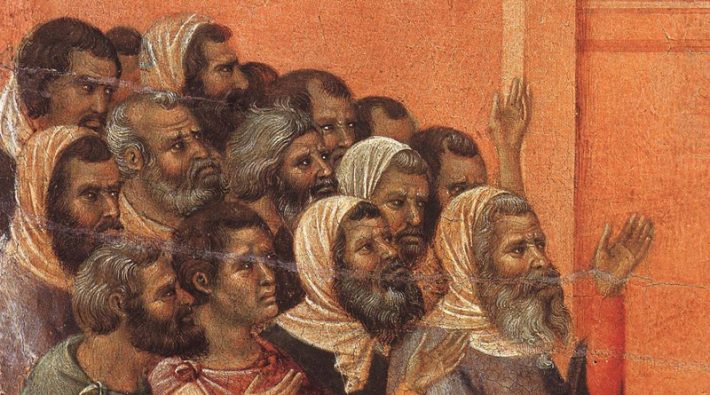Christian Art | Scribes And Pharisees | King James Audio Bible
Luke 11: 42-46 – Week 28 Ordinary Time, Wednesday (King James Audio Bible KJV, Spoken Word)
42 But woe unto you, Pharisees! for ye tithe mint and rue and all manner of herbs, and pass over judgment and the love of God: these ought ye to have done, and not to leave the other undone.
43 Woe unto you, Pharisees! for ye love the uppermost seats in the synagogues, and greetings in the markets.
44 Woe unto you, scribes and Pharisees, hypocrites! for ye are as graves which appear not, and the men that walk over them are not aware of them.
45 ¶ Then answered one of the lawyers, and said unto him, Master, thus saying thou reproachest us also.
46 And he said, Woe unto you also, ye lawyers! for ye lade men with burdens grievous to be borne, and ye yourselves touch not the burdens with one of your fingers.
The Gospel verses reflect a time when Christianity has split from Judaism, and also a time after the destruction of Jerusalem. In depictions of Jesus’ rebuke of the Pharisees, we discover an astonishing claim to transcendence on the part of the burgeoning Christian communities. There is too ambivalence: the Law remains intact in every detail, and yet it is overhauled. The truth of Christ so far surpasses the Pharisaic understanding of the Law, that it may be considered a New Law even as at the same time it is a fulfilment of the Old. We discover through these Gospel verses an astonishing claim on the part of the Christian writers, which is that they are the true recipients of God’s revelation to Moses, and that it is the Pharisees who have got it wrong.
There is in the Christian message an intense focus on inward purity and personal relationship with the goodness of God. The Pharisees are singled out in the Gospels as being hypocrites. They pretend to be holy. They put on an outward show of being holy. Inside, however, there is corruption, compared by Jesus to ritual impurity, such as that associated with contact with graves, while the overly precise attitude to the system of tithes, extending the rule of tithe to the most trivial things, makes a mockery of the system, effectively becoming a denial of its true purpose, which was to support the priest caste, for the worship offered in the Temple.
By the time of the writing of Luke’s Gospel, the Temple and Jerusalem are no more. A new consciousness emerges, through all four of the Gospels. The Gospels recall Jesus’ work and teaching in the light of the destruction of old Judaism. An extraordinary act of self-invention, on the part of Christian communities, is taking place.
Christ has come to us to call us toward the new. Through Christ, the old ways have passed away, and so finally we are free to experience the truth of God, which sets us free.
Concluding Prayer | Love Revealed By Jesus Christ
On the cross, Lord Jesus Christ,
you stretched out your hands for the salvation of the human race;
grant that our life and work
may be pleasing to you
and bear witness to the power of your redeeming love.
Who live and reign for ever and ever.

King James Audio Bible | Endnotes
Who Were The Pharisees?
The Pharisees were a prominent religious group during the time of Jesus, known for their strict adherence to Jewish law and tradition. They were highly respected by the Jewish people, and many looked up to them as models of righteousness and piety.
However, Jesus often had confrontations with the Pharisees, criticizing them for their hypocrisy and their focus on external piety rather than internal transformation. In Luke 11:42-46, Jesus denounces the Pharisees, saying: ‘Woe unto you, Pharisees! For ye tithe mint and rue and all manner of herbs, and pass over judgment and the love of God: these ought ye to have done, and not to leave the other undone.’
One of the main criticisms Jesus had of the Pharisees was their emphasis on external actions, such as tithing, while neglecting the more important matters of the law, such as justice, mercy, and love for God. Jesus taught that true righteousness comes from the heart and is expressed through actions that are motivated by love for God and love for others.
The origins of the Pharisees can be traced back to the period of Jewish history known as the Second Temple period, which lasted from approximately 516 BC to AD 70. During this time, the Jewish people were under the rule of various foreign powers, including the Persians, Greeks, and Romans. The Pharisees emerged as a group of Jewish leaders who sought to maintain the purity of Jewish identity and practice in the face of these external influences.
One of the key ways in which the Pharisees sought to do this was through the strict interpretation and application of Jewish law. They believed that the Torah, or Jewish law, was not only a set of rules to be followed but also a divine guide for righteous living. They placed great emphasis on the study and interpretation of the Torah, and many Pharisees were respected as experts in Jewish law.
However, as Jesus pointed out, the Pharisees often focused on the letter of the law rather than the spirit of the law. They were more concerned with outward piety and conformity to ritual than with inner transformation and obedience to God. Jesus criticized them for their hypocrisy, calling them ‘whitewashed sepulchres’ (Matthew 23:27) because they looked clean on the outside but were full of corruption and deadness on the inside.
Over the centuries, there have been various interpretations of the Pharisees and their role in Jewish history and theology. In the Catholic tradition, for example, the Pharisees are often seen as an example of legalism and religious pride, while in the Protestant tradition they are seen as a warning against externalism and hypocrisy.
One of the most influential thinkers on the Pharisees was the Jewish philosopher and theologian Moses Maimonides. In his famous work, the Mishneh Torah, Maimonides discusses the Pharisees at length, noting their dedication to the study of the Torah and their belief in the importance of obedience to God. However, he also criticizes them for their focus on external piety and their tendency to judge others harshly.
In more recent times, scholars such as E.P. Sanders and Jacob Neusner have re-evaluated the Pharisees and their place in Jewish history. They have argued that the Pharisees were not simply legalistic and hypocritical, but were actually a diverse and complex group of Jewish leaders who played a crucial role in preserving Jewish identity and practice in the face of external pressures.
The Pharisees serve as a reminder that true righteousness comes not from external actions or adherence to rules, but from a heart that is transformed by love for God and love for others. As Jesus said in Matthew 22:37: ‘Thou shalt love the Lord thy God with all thy heart, and with all thy soul, and with all thy mind. This is the first and great commandment. And the second is like unto it, Thou shalt love thy neighbour as thyself. On these two commandments hang all the law and the prophets.’
Jesus’ teachings challenged the Pharisees’ understanding of the law and their approach to righteousness. Jesus emphasized the importance of mercy, compassion, and love, which are portrayed as having often been neglected by the Pharisees in their pursuit of external piety.
Teachings of Jesus continue to inspire and challenge Christians of all traditions to live lives of love, justice, and compassion. The lessons of the Pharisees, both their strengths and their weaknesses, remind us of the dangers of legalism and hypocrisy and the importance of true obedience to God.








